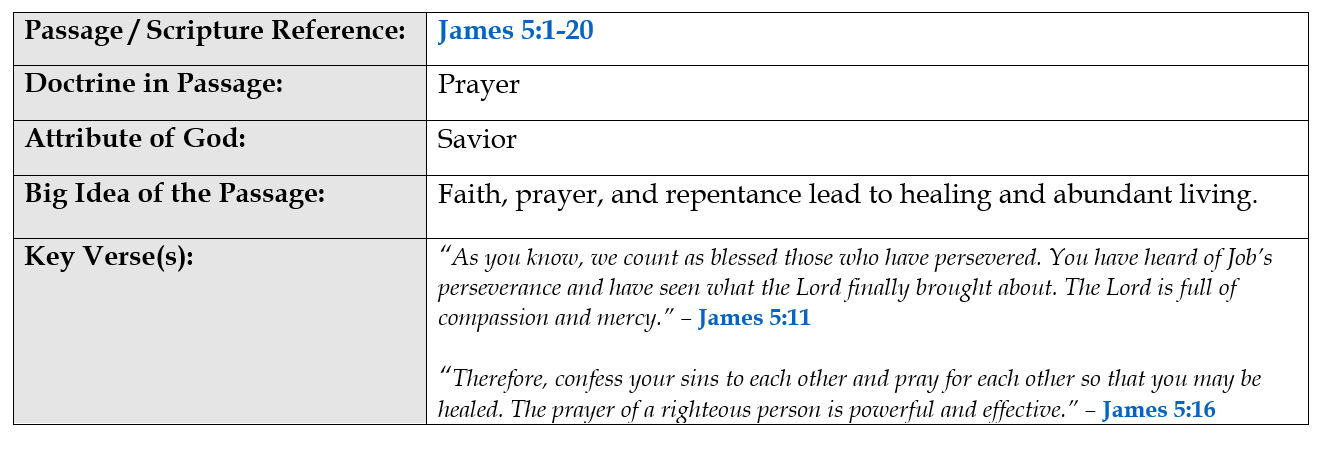I was reviewing John 1:14 with my eleven-year-old daughter and we discussed this verse: “The Word became flesh and made his dwelling among us. We have seen his glory, the glory of the one and only Son, who came from the Father, full of grace and truth.” – John 1:14
I asked my daughter after reading and reviewing, John 1:14, a few times, what was Jesus full of? Her answer back to me was “forgiveness”.

Imagine the spiritual weight taken away when forgiveness is extended to a person? In studying James 5, this verse (James 5:11) stands out to me, “As you know, we count as blessed those who have persevered. You have heard of Job’s perseverance and have seen what the Lord finally brought about. The Lord is full of compassion and mercy.” Forgiving faith often see’s the Lord more clearly.
It is probably not a coincidence but the the words “forgive, forgiven, and forgiveness” are repeated in the NIV Translation more in the Gospel of Luke, (18) eighteen times) than any other book in the bible. The word “heal” is also repeated in the Gospel of Luke (33) thirty three times in the NIV Translation, also repeated more in the Gospel of Luke than any other book in the bible. Luke was a physician and understood the healing to the body and soul when forgiveness is experienced. John Hopkins Medicine cites the health benefits of forgiveness in “Forgiveness: Your Health Depends on it”.
"Everyone thinks forgiveness is a lovely idea until they have something to forgive." - CS Lewis
Throughout the bible there are numerous examples of faith and forgiveness connected to physical healing including:
Humbleness, prayer, and repentance can lead to national healing (2nd Chronicles 7:14).
The woman who touched Jesus and was immediately healed (Matthew 9:20-22).
The blind man asking to Jesus to see (Mark 10:51-52).
The faith of the Roman Centurion (Luke 7:1-10).
The Samaritan woman healed at the Well (John 4:1-26).
The man born blind (John 9:1-12).
The prayers offered in faith to make a sick person well (James 5:15).
Here is my homiletic outline of James 5, let me know any feedback and if this helps breakdown the passage for anyone.
Content Summary:
James warns rich people who are hoarding and trusting in wealth in the last days to repent and change or it will have grave consequences.
James warns those who are rich and self-indulgent to not withhold wages to those who have served them and not to condemn those who are righteous.
James encourages believers to develop patience while awaiting the Lord’s workings and His return.
James also warns believers against grumbling about one another and the Lord’s judgement against such actions may be nearer (at the door) than they expect.
James reminds believers that the prophets and example of Job show the blessings of perseverance and the Lord’s compassion.
While developing patience and perseverance, believers should not swear or make statements that could later bring condemnation.
Prayer and praise can be deliverance from troubles and discouragement.
If anyone is sick, they should ask for Elders in the church to pray and anoint them with oil, prayers offered in faith can heal the sick.
Confession of sin brings healing, and the prayer of a righteous person is powerful and effective
James describes Elijah as an example for effective praying in calling for it not to rain on the land for three and ½ years.
Correcting a wandering believer from error to truth can lead to healing and abundant living.
Subject Sentence: Faith leans into patience, perseverance, prayer, and repentance while we wait for the Lord.
Aim: Faith in Christ is marked by perseverance, prayer, and repentance.
Principles or Timeless Truths:
Those who have worldly wealth may find themselves harder to correct and change course in the spiritual life. (Mark 10:17-27)
Suffering develops perseverance. (Romans 5:1-5)
Prayer is an offensive spiritual weapon, powerful and effective. (Ephesians 6:18, James 5:16).
Forgiveness is needed for physical and spiritual healing. (Psalm 103:3)
Forgiveness of sin is available through confession and repentance. (1st John 1:9)
Applications:
Questions for application:
(1) Is there an example for me to follow; (2) Is there a sin to avoid; (3) Is there a promise to claim; (4) Is there a prayer to repeat; (5) Is there a command to obey; (6) Is there a condition to meet; (7) Is there a verse to memorize; (8) Is there an error to mark; (9) Is there a challenge to face[1].
Lord help me to repent frequently, to be open to correction, and extend forgiveness to others like you have extended to me.
How about you, what is an application from James 5 for you?
Does your church practice James 5 healing?
[1] Questions taken from Living by the Book: The Art and Science of Reading the Bible by Howard D. Hendricks and William Dr. Hendricks, Page 339-341. Copyright 2007, Moody Publishers.






Thanks For restacking @Earnest Contender
Great scripture references, thank you.😊